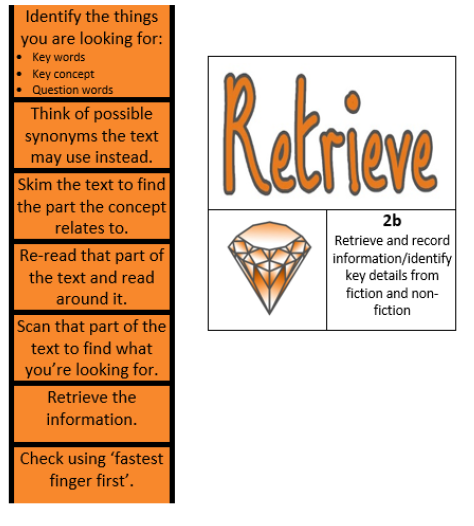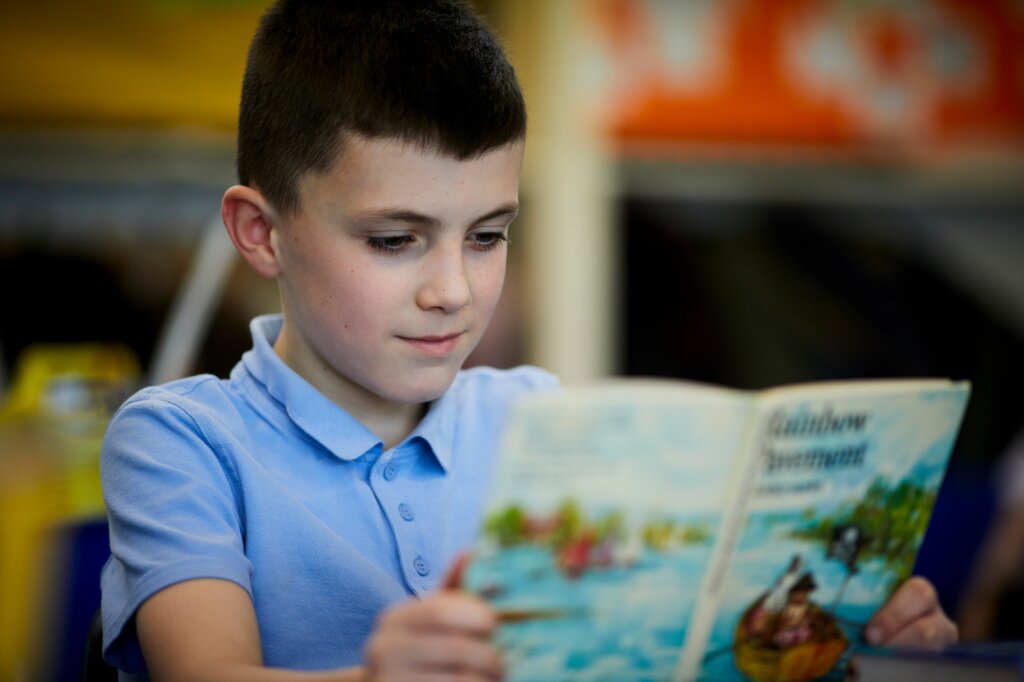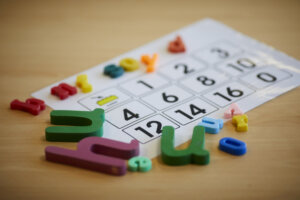
Why do we read? …Yes, we often read for pleasure, but what else? Try writing down everything you have read since waking up this morning. You might have read the news on an app or in a newspaper; read tweets or Instagram captions or read a recipe. That’s without all of the automatic reading we do without even noticing: what about reading the time on your watch, or an app name or symbol on your phone? We read constantly, not just words, but emotions and images. What unites most of our daily reading is that we read to retrieve information. Unless you read for pleasure vociferously, you are more than likely spending more time reading for information than you are for pleasure. Your primary reason for reading is retrieval.
The teaching of Reading is multi-faceted. Quite rightly, there is currently a focus on the teaching of decoding, however we must not forget the importance of teaching understanding. Teaching children how to read well must include teaching specific reading skills such as retrieval, inference and comparison. And by teaching, we do not simply mean through questioning, but through encouraging explicit understanding of what each skill is and how we can best apply them to reading and understanding texts. We place this at the heart of our approach.
Our approach to the teaching of Reading using our Reading Gems system has been described in detail in two blogs written by Jo Gray. You can read them here:
When teaching reading skills explicitly, it is crucial that staff develop their own subject knowledge about each skill. Just as you would not attempt to teach division to Year 6 without understanding how to divide using short division for instance, you cannot teach Reading effectively without knowing about reading skills. Retrieval is one such skill. Retrieval is often seen as the easiest of the reading skills as it involves taking information directly from a text. However, retrieval is still a complex skill to teach effectively and having good subject knowledge is crucial to supporting children to become excellent readers.
What is retrieval?
Retrieval, in its broadest terms, is defined as ‘the process of obtaining or extracting information or material‘ (Oxford Dictionary, 2019). When retrieving in reading, we are finding key details or information in the text and extracting them. Whenever we read, we retrieve. All reading depends on retrieval. Retrieval has to be developed before many other reading skills. For instance, you cannot make an inference without first being able to retrieve information. It is the most crucial reading skill for making deeper meaning and for reading for life, yet some staff do not teach it because they think it is too easy. Retrieval, like any reading skill, can be as challenging as you make it.
What strategies do children need to be able to retrieve information from a text?
- Find it in the text
All retrieval requires children to find and retrieve something from a text. However, it is amazing how so many children attempt to retrieve information from their memories or thin air. Children need to understand that for retrieval, the answer or content they need is always in the text. That is not to say that it will always have the same wording, however it will be there. Some children find retrieval difficult. If they are confident with decoding and can read the text with at least 90% fluency, it is likely that they are attempting to retrieve from memory or their extrinsic knowledge. For these children, it is crucial to remind them to always use the text, encouraging them to physically find the answer using a technique such as ‘fastest finger first’.
- Skim to get the gist
Skimming is an important skill to teach for retrieval, not just for summarising. If children can skim the text to get the gist, they can cut down on the possible locations of the text they are looking for and reduce the cognitive load. Using black-outs can support children to begin to skim paragraphs by focusing on the first line only.

- Identify and scan for key words methodically
Scanning is crucial for effective retrieval, however few children understand how to do this. Think of a Where’s Wally puzzle. People tend to attempt these puzzles in two different ways – grasping at straws and looking anywhere, or methodically. When searching for a key word, children often take the grasping at straws approach and struggle to locate the information, whereas if they are taught how to scan methodically they are much more likely to find what they are looking for.
- Use organisational features
Organisational features are included in texts to make them easier to read, however many children ignore them. It is important to instil in children the importance of reading everything on a page, from the title, to the introduction, to captions, subheadings and diagrams. Children need to know that these devices are used by the author to support them to find information.
More detail on these strategies can be found in our Retrieve skill overview linked below.
How can we teach it effectively?
- Teach and Model
It is important to explore what retrieval is and explicitly model how to retrieve information from different sources. This will usually be from a text but can also be from another source. Your thinking aloud voice is crucial here to demonstrate how to identify the key concept, scan the text for key words and locate the correct information. It is especially important to demonstrate always finding the information or details in the text itself, not from memory. You may find our skills ladders helpful for modelling the steps for the skill.

The retrieval skills ladder for both Key Stage 1 and Key Stage 2 are included in the free resources at the end of this blog.
- Practise
Work with children to practise retrieving information from images and texts. Competing to find the information fist using ‘fastest finger first’ is one way to practise effective retrieval. Activities such as ‘Where’s Wally’ puzzles; skimming and scanning games and eye spy are also great ways to encourage the retrieving of information. With any retrieval activity, it is crucial to emphasise a systematic method. For example, if practising retrieval using an image from Where’s Wookie, by simply adding lines and modelling scanning systematically, children are developing a much more methodical method.

By practising scanning this way, and then quickly moving on to practising using text, children are encouraged to scan each element rather than blindly searching for the answer. More suggestions for activities can be found in the skills overview resource linked below.
- Apply
Give children opportunities to retrieve different types of information from a wide range of sources. This may be through questioning or it can be through games and images. When children retrieve information, it is worthwhile to ask them to prove where in the text they located the information. With younger children, asking them to ‘put their finger on it’ or play ‘fastest finger first’ is useful, whereas with older children, you could just ask them to highlight or underline the pertinent part of the text. It is important that children are able to retrieve information from any text, therefore exposure to a wide range of fiction, non-fiction, poetry, playscripts and other texts is key.
Free Resources
We have developed skills guides for the teaching of the different reading skills. The retrieval skills overview can be accessed here and expands on the content discussed in this blog, with further ideas for teaching retrieval effectively. It also includes skills ladders to support children to use their retrieval skills when reading. Other skill guides are available on our Reading Award resources hub.
Download: All year group question stems
Download: Teaching Definition – Skills Overview
The Reading Award is a quality mark that demonstrates your school’s commitment to Reading. The resources hub is full of high quality resources to support you to improve and celebrate your provision for Reading. The Reading Award can be completed either online or with bespoke support from our team. For more information please visit our Reading Award page or email laura.lodge@oneeducation.co.uk
















